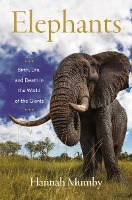What Jane Goodall did for chimpanzees, international ecologist and conservation scientist Hannah Mumby now does for elephants in this compelling, eye-opening account that brings into focus this species remarkably similar to humans?and makes a persuasive argument for saving them.
From early childhood, Dr. Hannah Mumby has loved wildlife, especially elephants. Her first wild elephant sighting at twenty-four changed the course of her life. Since then, she has devoted herself to studying these incredible animals and educating humanity about them. Hannahs field work has taken her around the world, where she has studied many elephant groups, including both orphaned elephants and the solitary elephant males.
These remarkable animals have so much to teach us, Mumby argues, and Elephants takes readers into their world as never before, revealing a society as complex as the chimpanzees, maybe even humans. Mumby's exploration of elephant culture provides an empathetic, humanistic portrait of these majestic animals, illuminating their personalities, memories, and rich emotional lives. Mumby explains how elephants communicate with one another and demonstrates the connection between memory and trauma?how it affects individual elephants and their interactions with others in their herd. Elephants and humans, Mumby makes clear, are not very different. From emotional bonding to communication, human and elephant experience similarly nuanced lives, and the commonalities she uncovers are both surprising and heartwarming.
Featuring a 16-page color insert of original photography, Elephants is a captivating, deeply moving exploration that offers a new way to look at these pachyderms and ourselves and a persuasive, passionate argument for rethinking our approach to animals and their conservation.

